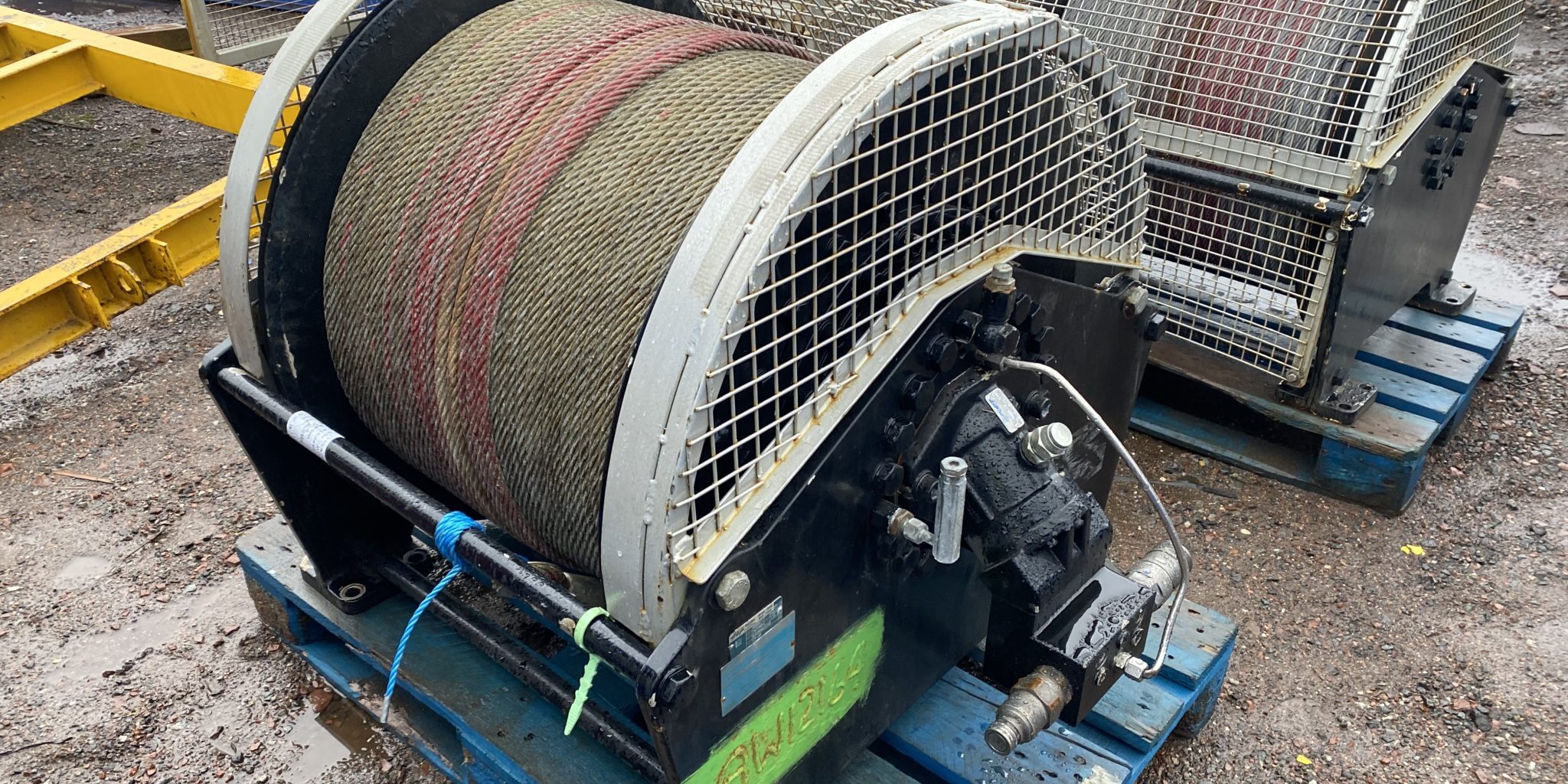In today’s day and age, there are many different winches on the market, all of which differ in size, power supply and pulling capabilities. One such winch is a hydraulic winch. Used for a range of applications across various industries, they are known to be one of the most heavy-duty, strong and reliable types of winches.
So, what is it that sets hydraulic winches apart from other winches? Read on as we discuss all you need to know about this type of winch in our ultimate guide; we’ll cover what they are and how they work, their typical applications and the benefits they offer.
What is a Hydraulic Winch?
A hydraulic winch is a type of large winch powered by hydraulic pressure. They are favoured for their high pulling capacity, smooth operation and ability to provide constant pulling force even at low speeds. They are often used in situations where electric power may not be readily available or where extreme pulling power is required, such as in heavy-duty recovery operations or industrial settings.
Their pulling capacity can also be easily controlled, including the power, direction and speed, which is often helped with the use of a gearbox.
How do they work?
A basic hydraulic winch comes with a low or high-speed motor. These feature a brake, a support shaft, a drum and a planetary gearbox. The motor has a large starting torque and is extremely efficient.
To explain the concept of hydraulics further, this type of system consists of a hydraulic pump, which is usually driven by the motor, and hydraulic lines that carry pressurised fluid (typically oil) to the winch motor.
When the pump is activated, it generates hydraulic pressure, which is transmitted through the lines to the winch motor. The motor then converts this hydraulic pressure into mechanical power to turn the winch drum, thus allowing it to pull or lift heavy loads.
Typical Uses of Hydraulic Winches
Hydraulic winches are commonly used in applications where a powerful and reliable winching system is required, such as on lorries, off-road vehicles, boats and industrial machinery. They are also suitable for the most demanding of tasks and can be used both on land and out at sea, being one of the most commonly used winch types on ships and docks.
Due to their size, they are more commonly used on an industrial scale than a commercial one. As such, they also tend to be more expensive and difficult to install, although the ease of use, reliability and additional benefits they offer once they have been installed are undeniable.
Looking more specifically at their typical applications, they are heavily relied upon in marine applications, the renewable energy sector and within oil and gas operations, all of which we will go on to explore in more detail.
Marine Applications
One of the reasons hydraulic winches are favoured for marine applications is due to their ability to withstand harsh weather conditions without their functionality being compromised. An electric winch, in comparison, is more susceptible to malfunction due to water and salt exposure, along with extreme temperatures.
Similarly, they are preferred over diesel winches, which would require access to a fuel supply, something which can be inconvenient to ensure when out at sea.
The strength these winches offer is also indispensable in many marine applications. This could include an array of things from securing vessels at ports to towing heavy loads or operating anchors. They offer precise and stable control over towing and mooring operations.
Renewable Energy
Hydraulic winches are heavily relied upon during the installation of renewable energy solutions, such as wind turbines or tidal and wave generation systems.
When it comes to wind turbines, they can also assist in lifting personnel and equipment to the top of the turbine for inspection, servicing and repair work, as well as to lower components for maintenance on the ground, such as gearbox or generator replacements.
Oil and Gas Operations
When it comes to both onshore and offshore oil and gas operations, hydraulic winches can be used in various aspects.
For example, they provide the necessary lifting power and control required for safe and efficient drilling operations. This includes being utilised in drilling rigs for handling drilling tools, equipment and drill string components, as well as being used for tasks such as hoisting and lowering drill pipes, casings and other tools into and out of the wellbore.
Benefits of Hydraulic Winches
Powerful
Perhaps the most key advantage of hydraulic winches is their power. They’re renowned for their high strength and superior pulling capabilities that can be relied upon across a large range of industrial applications.
These types of winches generate high torque, allowing them to handle heavy loads with unmatched ease. This power advantage is crucial in demanding operations where substantial forces need to be controlled, such as in mooring applications.
It’s for this reason that they are often preferred in situations where significant force is required, such as in industrial, construction and off-road recovery operations.
Durability and Reliability
Hydraulic winches are known for their durability and reliability in demanding industrial environments. They are constructed from heavy-duty materials and designed for rugged use, being able to withstand harsh operating conditions, such as extreme temperatures, moisture, dust and vibration, with minimal maintenance requirements.
Efficiency
As far as winches go, hydraulic winches are considered to be highly efficient, both in terms of energy-usage and from an environmental standpoint.
The hydraulic system itself allows for optimal power transmission with minimal energy losses, resulting in efficient winching operations and reduced operating costs over time.
Not only is this energy-efficiency better for operational purposes, but this makes them a more sustainable solution. Speaking of sustainability, many hydraulic winches now utilise biodegradable fluids that have less of a negative effect on the environment, and are better designed to minimise the risk of oil spills.
Precise
Despite their large size, hydraulic winches offer precise control over the movement of the winch cables. This allows for smooth operation and operators can adjust the line tension accurately to best suit the application at hand.
This level of control allows for gradual acceleration and deceleration, minimises shock loads and ensures safe and controlled movement of loads. This feature is particularly beneficial in tasks that require precise positioning or the handling of delicate loads.
Many hydraulic winches are also equipped with safety features such as overload protection and emergency stop mechanisms. These features help prevent accidents and ensure safe operation, particularly in high-risk environments or when handling heavy loads.
Versatile
Hydraulic winches are incredibly versatile and can be adapted to various applications and mounting configurations. They are available in a wide range of sizes, capacities and configurations to suit different industries and tasks.
In addition to this, they can be mounted on various vehicles, equipment or stationary structures, offering flexibility in deployment and use. They can also be tailored to meet specific operational needs, including line pull capacity, line speed and drum capacity – another reason they are so convenient for such a wide range of applications.
Alongside their versatility is their adaptability. Unlike other types of winches, they are able to better adapt to different conditions. This is especially the case in outdoor applications, whereby they are exposed to changing weather conditions. They are less likely to experience electric failures thanks to their design to resist corrosion, moisture and extreme temperature conditions.
Low Maintenance
The hydraulic components used in these winches are designed for durability and require minimal maintenance. This is largely thanks to the absence of electrical components, which significantly simplifies maintenance routines. Lower required maintenance subsequently reduces the risk of malfunctions and minimises downtime.
Routine checks and inspections and regular hydraulic fluid replacement tend to be sufficient for ensuring maximum operation at all times.
Winch Solutions with Atlas Winch Hire
Could a hydraulic winch suit your lifting and pulling needs? We offer hydraulic winches for sale here at Atlas Winch Hire & Hoist Services.
We offer a comprehensive range of hydraulic winches, available in a variety of dimensions and weights. The base mounted models listed here are supplied within a crash frame, which is fitted with lifting lugs for improved security.
We also provide a range of hydraulic power units designed to provide reliable, continuous power in remote and challenging conditions.
Regardless of what your hydraulic requirements may be, get in touch with us today and our expert team will be happy to assist you.








